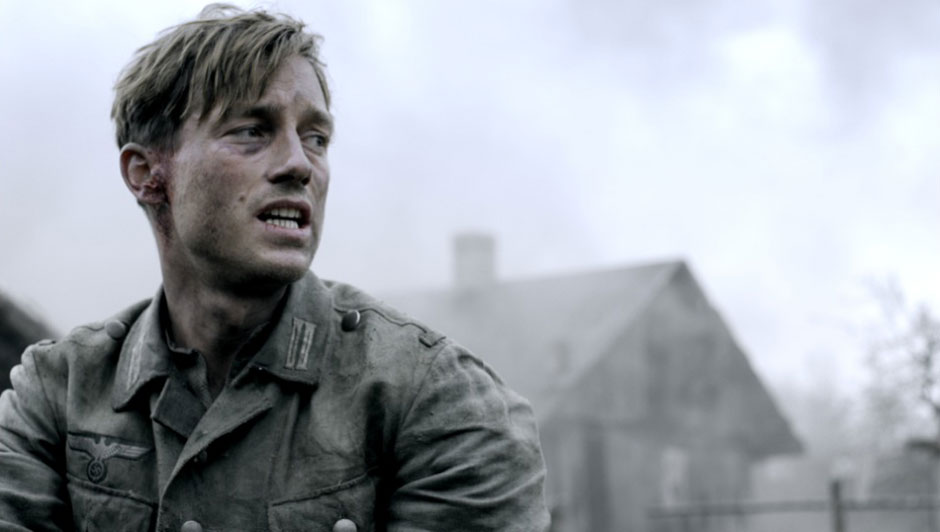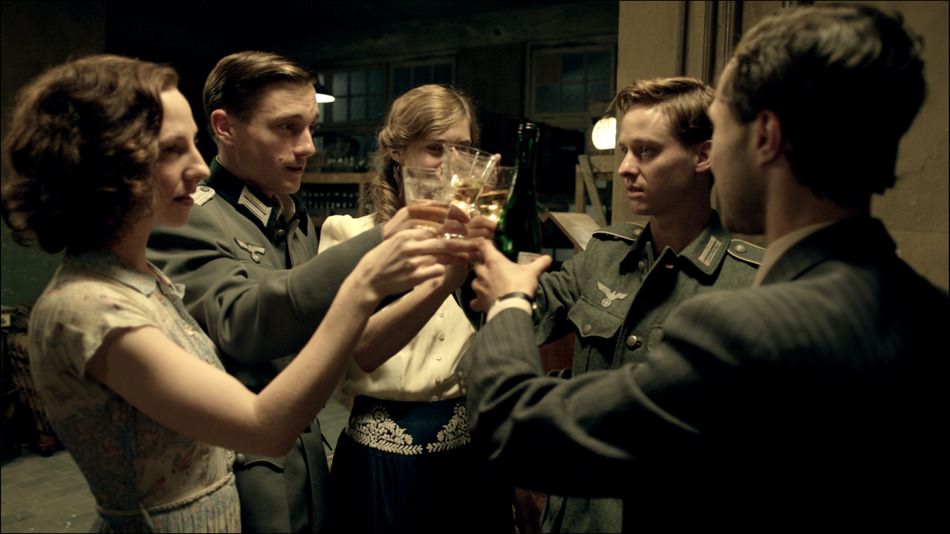Generation War is an odd title for a television melodrama set in World War II, first broadcast in three episodes on German TV, and now released as a two-part movie in the US. The German title, Our Mothers, Our Fathers, is more evocative, certainly to a German audience. But in fact, even that is not entirely accurate, since the director, Philipp Kadelbach, was born in the 1970s, and his cast is even younger. Perhaps it should have been Our Grannies and Grandpas, but that might have sounded a little too mawkish for what is supposed to be a hard-hitting depiction of people caught up in a brutal war—a depiction that has stirred up considerable controversy among non-German audiences.
The main characters in the drama are five young, educated Berliners, none of them convinced Nazis. They adore swing music (banned in the Third Reich). One, a little tailor with thick black hair named Viktor, is a walking Jewish caricature. Two of the others, Wilhelm and Friedhelm, are brothers who join the Wehrmacht in 1941, just in time for the invasion of the Soviet Union. Wilhelm is keen and manly, fine officer material; Friedhelm is the opposite—bookish, sensitive and filled with loathing for the war. Wilhelm’s undeclared sweetheart, Charlotte, is proud to serve on the Eastern Front as an army nurse. The fifth character is a young woman named Greta, who loves Viktor and wants to be a famous singer, like Marlene Dietrich. She has an affair with a Gestapo officer, hoping to save Viktor as well as to boost her career in Third Reich showbiz.
We follow the band of five through all their adventures, which, in true soap opera fashion, intersect in coincidental and often highly implausible ways. We see the horrors of a field hospital, where men scream in pain and local (Russian) nurses are treated as slaves. We see Jews being beaten out of their ghetto houses by Ukrainian thugs under the supervision of the Germans. We see innocent civilians shot or hanged by German soldiers. We see Viktor escape from a train bound for Auschwitz. We see Polish traitors and Polish partisans, some of them as antisemitic as they are anti-German. We get a glimpse of drunken Soviet soldiers raping Charlotte, the German nurse. And, finally, we see a cigar-chomping American officer in Berlin after the war, allowing the dastardly former Gestapo officer who had the affair with Greta, and was responsible for her later execution, to carry on working for the Allied authorities, as though nothing had changed.
Millions of German and Austrian viewers thought the series was wonderful. So why has there been so much fuss about it, especially in Poland, where the filmmakers were accused of “falsifying history”? American critics, such as A.O. Scott in The New York Times, have also criticized the film for creating a false moral equivalence between suffering German soldiers and nurses and their suffering Polish or Russian enemies. In this view, Generation War seems to suggest that there were antisemitic bastards on all sides, in Poland and the Ukraine no less than in Germany. So we should say a prayer for all victims of war and let bygones be bygones. But is that really all the film is saying?
Everything in Generation War could conceivably have happened in real life, even if the presentation is somewhat slick. The battle scenes are filmed à la Spielberg, with a kind of Hollywood panache. We are not exposed to the worst things the Germans did; there are no images of death camps or torture. This may be a good thing. Cinematic attempts—by Spielberg, for example—to show the gas chambers can never approach reality, and too easily veer into kitsch. Few viewers would miss the implications when a Polish prisoner relates that trains enter the camps full of people and leave empty. More attention might have been paid to the Holocaust, which has become the central theme of World War II remembrance. But it was not the main part of most Germans’ experience of the war, and that, after all, is what this drama is about. The commentary, some of it spoken by an anonymous narrator, and some by Wilhelm, the tough brother who survives the war, does make it quite clear that Germans were responsible for the devastation of Europe. The main message, repeated several times by Friedhelm, the younger brother, is that war brings out the worst in people. The Germans thought they were heroes when they fought their way east, but they ended up as mass murderers.
Apart from the bizarre coincidences (how often can five friends cross paths on a battlefield stretching all the way from Poland to the northeast of the Ukraine?), Generation War has other typical marks of TV melodrama. The band of five are all good-looking. We get to like them, and root for their survival. Then there are the villains: the Gestapo officer and the ruthless Nazi killers who order reluctant soldiers to be accomplices in the massacres. These men are all bad-looking: pock-marked, porcine, or blonde beasts.
Advertisement
One could argue from this that the image of attractive ordinary Germans, dragged into a conflict by evil sadists, lets the Germans off the hook. After all, they had no choice. They might be seen as victims of the Nazis too. But the picture drawn in Generation War is more complicated. Most of the young Germans in the film—the nurses, the soldiers, the people back in Berlin, including the woman who moved into the apartment belonging to Viktor’s family before they were kicked out—are poisoned by Nazi propaganda. And even our attractive heroes are not really innocent. Not only does Greta further her own career by giving herself to a Gestapo officer, but Charlotte betrays a Jewish nurse, who had helped her, and Friedhelm, the sensitive boy, ends up hanging partisans and shooting children.
But there is another way of reading the film. If the story is about attractive young Germans trying to be decent in a thoroughly indecent war, it is clear that the heroes fail. They, too, become morally corrupted. This would not be such a powerful idea if the heroes had looked as villainous as the out-and-out brutes. It is the fact that our grannies and grandpas could become traitors, opportunists, and killers that sends an important message. That the film tries to understand rather than condemn is not a form of special pleading for the Third Reich. On the contrary, it shows that almost no one could remain decent in a system that was obscene.
Television mini-series are sometimes more effective than art forms of greater sophistication, and not just because they reach a wider audience. Their characters become familiar to us through time. We live with them. Those who sneered at the American mini-series Holocaust (1979) for its vulgar portrayal of mass murder underestimated its impact, on German viewers in particular. The victims, as well as some of the killers, suddenly got a human face. The banality of the series worked to its advantage. For the protagonists could have been our next-door neighbors. The series broke down the abstraction of the six million dead.
But what about the Polish objection that the depiction of Polish partisans was a falsification of history? That many Poles, including partisans, were antisemitic cannot be denied. To have shown all the Poles as heroic defenders of the Jews would have been a falsification. And there are Polish characters in Generation War who help Viktor escape. In fact, the moral dilemmas faced by the partisans—is it worth provoking inevitable reprisals against innocent Poles by killing Germans?—are rather well observed in the movie.
And yet the Polish critics have a point. Even if Poles, Ukrainians, and other foreigners behaved badly, a German soap opera about the Eastern Front might not be the best vehicle to stress this. But there is a more serious issue, the question of balance. The non-German participants in the story, from the antisemitic Poles to the Ukrainian thugs to the cigar-chomping American, are mostly cast in a negative light. The movie doesn’t actually say that they were as bad as the Germans, or as complicit in the Nazi crimes. But viewers might easily come away with that impression. The American who knowingly employs a former Gestapo officer (as did happen on occasion, since Gestapo agents were thought to be experienced hunters of Communists) is not just the only American we get to see, but he has to be wielding a big cigar, too. The Polish partisans look like a filthy ragtag bunch (as they would have done, surviving in the forest), even as the German soldiers still manage to look rather dashing in the icy ruins of a battle front. Russian soldiers are seen only from a distance, either shooting at the Germans or molesting women.
The feeling one gets, then, is that no matter how awful the crimes of Hitler’s Germany may have been, one would rather spend time with our nice German heroes than with those disreputable foreigners. To repeat, there is no hint in the movie that this absolves Germany of its historical sins. But we are made to like some of the men and women who committed them. And apart from the Russian Jewish woman, betrayed by the German nurse, and one or two Poles, the foreigners are thugs.
Advertisement
Perhaps the English title is not entirely wrong after all. For in the background is a conflict between German generations. The first postwar generation often condemned their parents. Moral judgment of their elders and national self-hatred were a part of the protest movements of the 1960s that culminated in the horrific violence of the Red Army Faction. Generation War shows that this particular generational war may now be over. The post-‘68ers can make peace with their grandparents without denying the horror of what they did, or was done in their name.
One should not reproach them for this. It is also understandable that young Germans should not wish to be burdened with the guilt of what their grandparents did. Germany today is a “normal” nation, despite the deep abnormality of its twentieth-century past. To claim that war brings out the worst in all of us might add to the sense of normality. But it is not completely true—it brings out the best in some people. And it is inadequate, for it was not just the war that brought out the worst in Germans, but a regime, an ideology, a society that was rotten. For this, foreigners cannot be blamed.
Generation War is in theaters now.




